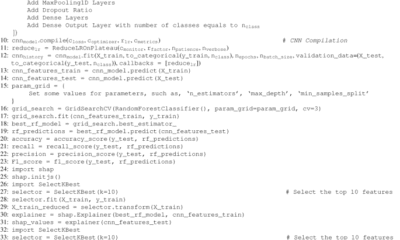AI Research
Is AI watching you? The hidden links between research and surveillance

You have full access to this article via your institution.
Download the Nature Podcast 25 June 2025
We’d like to learn more about our listeners, please help us out by filling in this short survey.
In this episode:
00:45 Is AI-research being co-opted to keep track of people?
A significant amount of research in the AI field of computer vision is being used to analyse humans in ways that support the development of surveillance technologies, according to new research. By analysing the contents of thousands of research papers, the team behind the work showed that 90% of studies, and 86% of patents resulting from them, involved data relating to imaging humans. Although there are many positive applications for this technology, such as in medical diagnostics, this work shows evidence of a pipeline from computer-vision research to surveillance.
Research article: Kalluri et al.
News and Views: Computer-vision research is hiding its role in creating ‘Big Brother’ technologies
Video: Is AI powering Big Brother? Surveillance research is on the rise
News: Wake up call for AI: computer-vision research increasingly used for surveillance
Editorial: Don’t sleepwalk from computer-vision research into surveillance
09:38 Research Highlights
A minuscule robot that can manipulate liquid droplets, and the sensors that can identify hydrothermal explosions at Yellowstone National Park.
Research Highlight: This tiny robot moves mini-droplets with ease
Research Highlight: Sensors pinpoint the exact time of a Yellowstone explosion
12:12 The first images from the world’s largest digital camera
This week, the Vera C. Rubin Observatory in Chile has unveiled the first images from its 3,200 megapixel digital camera. We discuss the images, and how the facility will help researchers learn more about the Universe.
News: First images from world’s largest digital camera leave astronomers in awe
19:18 Briefing Chat
How scientists created hexanitrogen, a new molecule made of six nitrogen atoms, and the why researchers are excited about the first confirmed skull of an extinct Denisovan.
Chemistry World: Most energetic molecule ever made is stable – in liquid nitrogen
Nature: First ever skull from ‘Denisovan’ reveals what ancient people looked like
Never miss an episode. Subscribe to the Nature Podcast on Apple Podcasts, Spotify, YouTube Music or your favourite podcast app. An RSS feed for the Nature Podcast is available too.
AI Research
Oxford secures £118m for AI-driven vaccine research with Ellison Institute

The University of Oxford has launched a £118m AI vaccine research programme, CoI-AI, with the Ellison Institute, aiming to combat antibiotic resistance through human challenge trials
A new initiative, led by Oxford Vaccine Group, named CoI-AI (Correlates of Immunity-Artificial Intelligence), will combine Oxford’s expertise in human challenge studies, immune science, and vaccine development with the Ellison Institute of Technology (EIT)’s Artificial Intelligence (AI) technology. The Ellison Institute will provide its advanced AI technology to the initiative, enhancing our understanding of infections and how vaccines protect us.
CoI-AI programme: Combining human challenge trials and artificial intelligence
The CoI-AI programme will focus on how the immune system responds to germs that cause serious infections and contribute to antibiotic resistance, such as Streptococcus pneumoniae, Staphylococcus aureus, and E. coli. Researchers will utilise human challenge models, where volunteers are safely exposed to bacteria under controlled conditions, and apply modern immunology and AI tools to pinpoint the immune responses that predict protection.
The CoI-AI programme, established in December 2024 through a strategic alliance between the University of Oxford and EIT, aims to develop solutions and create future leaders needed to tackle some of the most significant and challenging challenges facing humanity, thereby significantly impacting the global health landscape.
EIT is renowned for its groundbreaking research and commercial capabilities, driving scientific discoveries and fostering sustainable and ethical companies. The Ellison Institute combines cross-cutting capabilities and expertise in generative biology, clinical medicine, plant science, sustainable energy, public policy, and other related fields. The research is supported by substantial computing capability enabled by Oracle, a world-class Artificial Intelligence team, and a Scholars programme which aims to help the world’s finest up-and-coming scientists.
Tackling urgent problems in infectious diseases
Professor Sir Andrew Pollard, Director of the Oxford Vaccine Group, said: “This programme addresses one of the most urgent problems in infectious disease by helping us to understand immunity more deeply to develop innovative vaccines against deadly diseases that have so far evaded our attempts at prevention. By combining advanced immunology with artificial intelligence and utilising human challenge models to study diseases, CoI-AI will provide the tools necessary to tackle serious infections and mitigate the growing threat of antibiotic resistance. This is a new frontier in vaccine science.”
Professor Daniela Ferreira, Deputy Director of the Oxford Vaccine Group, said: “This programme will give us completely new tools to study how vaccines work at both a cellular and system-wide level, by studying infections in real time, in people, and using smart immunology tools and data to find the answers. This will open up whole new avenues to vaccine design as we improve our understanding of infection and immunity.”
Larry Ellison, Chairman of the Ellison Institute of Technology, said: “Researchers in the CoI-AI programme will use Artificial Intelligence models developed at EIT to identify and better understand the immune responses that predict protection. This vaccine development programme combines Oxford’s leadership in immunology and human challenge models with cutting-edge AI, laying the groundwork for a new era of vaccine discovery – one that is faster, smarter, and better able to respond to infectious disease outbreaks throughout the world.”
Professor Irene Tracey, Vice-Chancellor of the University of Oxford, said: “This is a major step forward in our strategic alliance with the Ellison Institute. Together, we’re combining Oxford’s strengths in vaccine science with EIT’s bold vision to tackle some of the toughest problems in global health. This is about drawing more talent and capacity to the Oxford ecosystem to turn scientific challenges into real solutions for the world.”
AI Research
National AI congress in natural resources to spotlight challenges in education, research

TEHRAN – The first national congress on artificial intelligence (AI) in natural resources aims to focus on challenges in education, research, and its applications in agriculture, natural resources, and the environment.
The two-day event will be held from September 4–5 at Shiraz University, Fars Province, with the theme ‘intelligent technology, green land, and sustainable future.
It highlights the integration of emerging technologies, such as AI, in research and technological projects.
Over 30 lecturers will share their scientific and research achievements through presentations divided into six panels and two specialized meetings, ISNA reported.
Two specialized sessions titled ‘Artificial Intelligence: Governance in Education and Research’ and ‘Precision Agriculture: Adoption, Education, Infrastructure’ will focus on AI challenges in education, research, and its application in agriculture.
The congress will be centered around productivity and promotion of natural and agricultural industries, smart management of water resources and climate, meteorology, climate change and ecosystem, sustainable agriculture, smart agriculture, big data and agricultural development, biodiversity and pests, remote sensing of natural resources, nature management, improvement of food quality and security, smart robotics, technological education, as well as ethical research in agriculture.
Some $100 million allocated to develop AI
In April, the Vice Presidency for Science, Technology, and Knowledge-Based Economy and the National Development Fund (NDF) signed a memorandum of understanding (MOU) to create a 100-million-dollar fund for the development of the artificial intelligence (AI) sector in the country.
Signed by Hossein Afshin, an official with the vice-presidency of science and technology, and Mehdi Ghazanfari, the head of the NDF, the MOU aims to establish a framework for the development and implementation of AI in line with the seventh national development plan (2023-2027) and the Leader of the Islamic Revolution Ayatollah Seyyed Ali Khamenei’s emphasis on investing in emerging fields, ISNA reported.
Accordingly, the projects introduced by the vice-presidency for science and technology will be funded through loans, partnerships, and other ways of financing. To further boost cooperation between universities and the private sector, the NDF will grant specific loans to those companies that financially support AI-based projects in universities and scientific centers.
In return, the vice-presidency for science and technology will use financing tools for emerging technologies.
MT/MG
AI Research
Accenture buys generative AI business | News

US – Accenture has agreed to acquire generative AI consulting company NeuraFlash for an undisclosed amount subject to customary closing conditions.
The deal will help strengthen Accenture’s Salesforce gen AI and managed services capabilities, with NeuraFlash focused on agentic AI tools for sales, services and field service operations.
The acquisition will see 510 staff at NeuraFlash join Accenture, primarily in North America with additional staff in Colombia and India.
Accenture said that in addition to NeuraFlash’s Salesforce and Agentforce implementation experience, the business also has Amazon Web Services capabilities, delivering personalised experiences for contact centre customers with machine learning and generative AI.
NeuraFlash is based in Massachusetts and was founded in 2016, specialising in using generative AI in complex business processes, agentic programs, analytics, in managing change and providing ongoing managed services.
Stephanie Sadowski, senior managing director and Salesforce Business Group global lead for Accenture, said: “This acquisition will significantly enhance our agentic AI capabilities and allow us to better serve the mid-market, in direct alignment with Salesforce’s strategic direction.
“By integrating NeuraFlash’s expertise, we aim to help accelerate enterprise AI adoption and drive innovation for clients across industries.”
T Brett Chisholm, chef executive and co-founder at NeuraFlash, added: “Joining forces with Accenture will help us continue to scale, amplify our impact globally and expand our gen AI capabilities to create new, exciting avenues for innovation.”
-

 Business3 days ago
Business3 days agoThe Guardian view on Trump and the Fed: independence is no substitute for accountability | Editorial
-
Tools & Platforms3 weeks ago
Building Trust in Military AI Starts with Opening the Black Box – War on the Rocks
-

 Ethics & Policy1 month ago
Ethics & Policy1 month agoSDAIA Supports Saudi Arabia’s Leadership in Shaping Global AI Ethics, Policy, and Research – وكالة الأنباء السعودية
-

 Events & Conferences3 months ago
Events & Conferences3 months agoJourney to 1000 models: Scaling Instagram’s recommendation system
-

 Jobs & Careers2 months ago
Jobs & Careers2 months agoMumbai-based Perplexity Alternative Has 60k+ Users Without Funding
-

 Funding & Business2 months ago
Funding & Business2 months agoKayak and Expedia race to build AI travel agents that turn social posts into itineraries
-

 Education2 months ago
Education2 months agoVEX Robotics launches AI-powered classroom robotics system
-

 Podcasts & Talks2 months ago
Podcasts & Talks2 months agoHappy 4th of July! 🎆 Made with Veo 3 in Gemini
-

 Podcasts & Talks2 months ago
Podcasts & Talks2 months agoOpenAI 🤝 @teamganassi
-

 Mergers & Acquisitions2 months ago
Mergers & Acquisitions2 months agoDonald Trump suggests US government review subsidies to Elon Musk’s companies





















